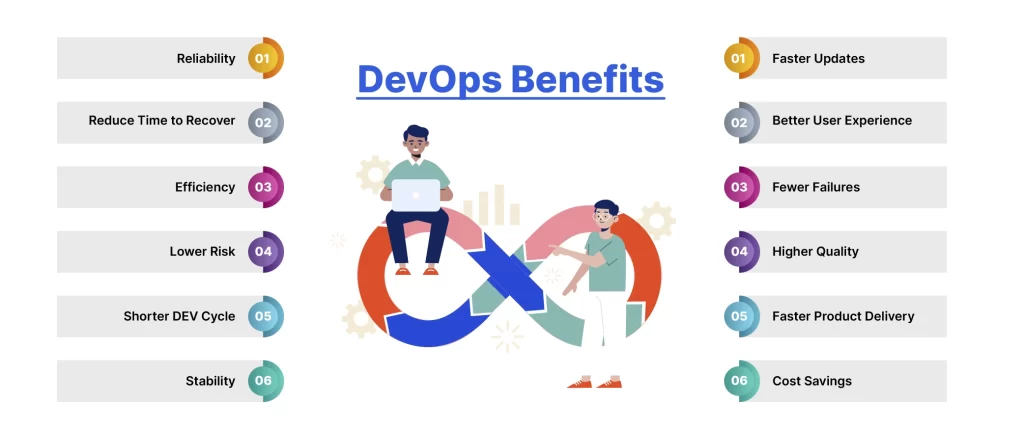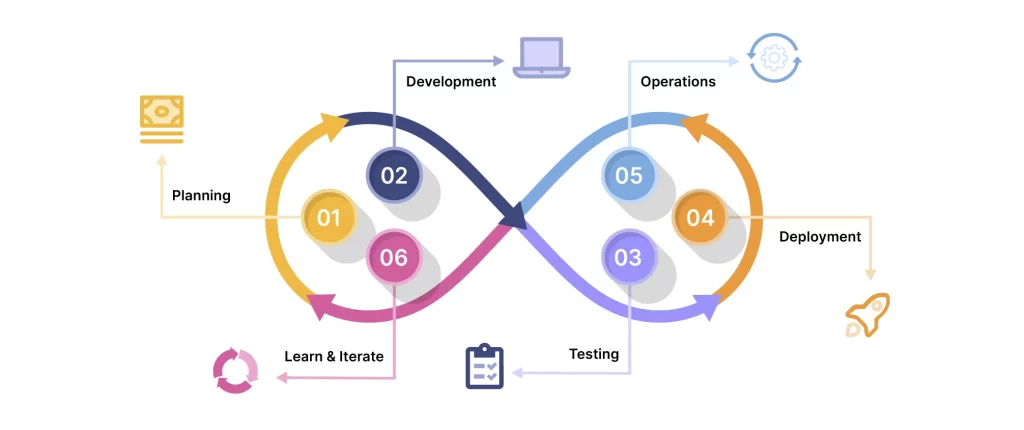When teams operate independently, it creates communication gaps that can lead to disorder. In contrast, when teams collaborate, they tend to be more efficient.
Do you know why DevOps is important? In today’s rapidly growing digital landscape, businesses strive to outperform their competition by delivering software solutions that are not only innovative but also meet customer needs before deadlines. As a result, DevOps emerges as a crucial factor for achieving business success.
Furthermore, DevOps – a combination of development, operations, and quality assurance practices, enables organizations to streamline their software development processes, foster collaboration, and drive continuous improvement.
In this article, we will explore why DevOps is important for businesses in 2023. We will delve into the key benefits, trends, and principles associated with DevOps, empowering organizations to unlock their full potential in the digital age.
So, let’s start by learning some benefits of DevOps
In the fast-paced world of software development, time-to-market plays a vital role in gaining a competitive edge. Moreso, DevOps provides a strategic advantage by accelerating software delivery. By implementing automation, continuous integration aka CI, and continuous delivery (CI/CD) pipelines, organizations can significantly streamline their software development lifecycle.
As a result, it reduces manual efforts, ensures faster time-to-market, and allows businesses to stay ahead in the dynamic market landscape.
Successful software development requires seamless collaboration and effective communication among various teams, including development, operations, and quality assurance.
DevOps process breaks down traditional silos, fostering a culture of collaboration and innovation. By promoting cross-functional teams and shared responsibility, organizations can enhance efficiency, maximize productivity, and produce superior-quality software solutions.
Delivering high-quality software is essential for any business’s success. That’s why the DevOps process emphasizes the integration of automated testing, continuous monitoring, and feedback loops throughout the software development process.
This is the approach that enables organizations to achieve enhanced quality and reliability.
As a result, by detecting and addressing bugs and issues early on, businesses can ensure a stable and robust product that meets customer expectations.
DevOps practices offer a solution by eliminating waste, reducing rework, and increasing operational efficiency. Through the automation of repetitive tasks and the utilization of cloud infrastructure, organizations can scale their operations effectively.
As a result, this leads to significant cost savings, enabling businesses to allocate resources efficiently and invest in innovation.

As we have stepped into 2023, several trends of DevOps are reshaping the Development Operations landscape and it is obvious why DevOps is important:
To address the increasing complexity of software development, Developers Operations strongly recommends the implementation of shift left testing principles. Shift Left is an approach that involves integrating testing activities as early as possible in the software development lifecycle, starting from the requirements-gathering phase.
By adopting this approach, organizations can identify and address defects early, reducing the cost and effort required for bug fixing in later stages of development.
IaC involves managing and provisioning infrastructure resources through code, enabling organizations to automate infrastructure deployment and configuration. By treating infrastructure as code, businesses achieve greater consistency, scalability, and reproducibility in their infrastructure environments resulting in improved efficiency reduced manual errors, and enhanced operational agility.
Cloud-native development has emerged as a DevOps trend in 2023. By leveraging the capabilities of cloud computing, organizations can build and deploy applications specifically designed for cloud environments.
Cloud-native development offers benefits such as scalability, resilience, and flexibility, enabling businesses to respond swiftly to changing market dynamics. The above trend empowers organizations to optimize resource utilization, reduce operational costs, and enhance overall performance.
The DevOps process typically follows the following stages:

In the planning phase, intellicoWorks define the scope, objectives, and requirements of the software development project. This stage involves collaboration between different teams to align goals and establish a clear roadmap. Planning also includes resource allocation, timeline setting, and risk assessment to ensure a smooth and efficient development process.
During the development phase, developers write code, and version control systems track changes. Continuous integration practices ensure that code changes from multiple developers are integrated regularly, allowing for early detection of conflicts and promoting collaboration. This stage focuses on coding, implementing features, and creating a solid foundation for the software solution.
The testing phase is crucial for ensuring software quality. Automated testing frameworks are used to validate the functionality, performance, and security of the application. Continuous testing practices enable rapid feedback and bug detection, ensuring a robust and reliable product. This stage includes various testing types, such as unit testing, integration testing, and user acceptance testing, to ensure comprehensive quality assurance.
In the deployment phase, the application is released to the production environment. DevOps practices emphasize the use of automation for seamless and consistent deployment, reducing the risk of errors and minimizing downtime. Continuous delivery and deployment pipelines enable organizations to efficiently package, deploy, and configure their software solutions, ensuring smooth releases and efficient rollout to end-users.
Once the application is deployed, operations teams monitor and manage its performance and availability. Continuous monitoring, logging, and alerting systems help identify and resolve issues promptly, ensuring optimal system performance. This stage focuses on maintaining the application’s stability, monitoring resource usage, and addressing any operational concerns to deliver a seamless user experience.
The final stage of the DevOps process involves learning from the feedback received and continuously improving the application. Data-driven insights, user feedback, and performance metrics drive iterative development and enhancements. By analyzing data and incorporating user feedback, organizations can adapt to changing market needs, fix any issues or limitations, and deliver value-driven solutions.
To sum up we can mention that DevOps has become an essential enabler for achieving business success in the evolving era of 2023. The advantages of DevOps make it indispensable for organizations aiming to stay competitive in the digital age. And, by embracing DevOps trends businesses can further enhance the efficiency and effectiveness of their DevOps practices. Furthermore, it is evident by all the above information provided that adopting DevOps principles and methodologies empowers organizations to adapt to market demands, deliver high-quality software solutions, and position themselves for sustainable growth and success. By partnering with IntellicoWorks businesses can unlock the full potential of DevOps services and propel their success in the digital era.

Talk to us and let’s build something great together
A Subsidiary of Vaival Technologies, LLC
IntelliCoworks is a leading DevOps, SecOps and DataOps service provider and specializes in delivering tailored solutions using the latest technologies to serve various industries. Our DevOps engineers help companies with the endless process of securing both data and operations.
Ops
Cloud
AI & ML
Copyrights © 2023 byIntellicoworks. All rights reserved.